Happy Birthday to Aunt Sue from Mamou
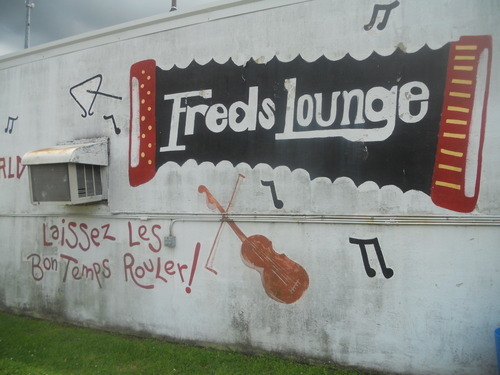
May 29, 2013—
MAMOU, La.—The good folks of rural Mamou know how to start Saturday on the right foot.
Fred’s Lounge opens at 7:30 a.m. Saturday, 420 6th St. in what is left of uptown Mamou (pop. 3,300).
It closes at 2 p.m. For the rest of the week.
Hardscrabble regulars and a sprinkling of European tourists dance to live Cajun-French music from Don Fontenot and Les Amis De La Louisiane (Friends of Louisiana) who play in the middle of the bar. The lounge only holds about 150 people.
The event is broadcast live between 9:30 and 11:30 every Saturday morning on a tinny AM frequency that is also magical for American gospel and 1950s rhythm and blues because it sounds like you are holding on to something so far away.
The old music fades in and out but the memories of Fred’s Lounge will forever remain.
And then, around 2 in the afternoon, last call is served at Fred’s Lounge. This is just about the time some people are waking up three hours east in New Orleans.
Sue Vasseur is the general manager of Fred’s Lounge.
The locals call her “Tante Sue de Mamou” and she turns 83 years old on June 3.
Translated, she is “Aunt Sue.”
On a recent Saturday she smiled and said, “You have a relative in Mamou. I’m your aunt.”
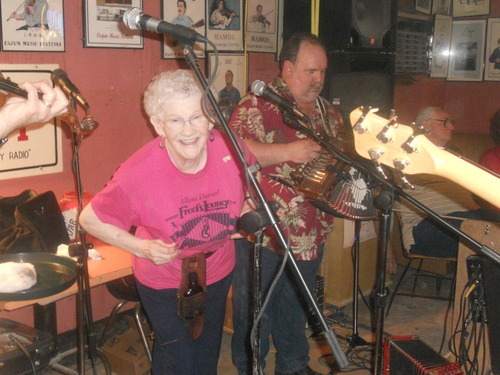
Sue dances and is known to pull at the drawing of an accordion on the front of her Fred’s Lounge tee shirt. “People think I’m playing with my boobs,” she said. Only on Saturdays Sue wlll take a swig or two of Hot Damn cinnamon schnapps from a pint she keeps in her holster. Actually many people in Mamou love Hot Damn and they can be seen down the sleepy sidewalks of 6th Street carrying pints of Hot Damn as if they were bottles of water.
“Maybe you’ve had Hot Damn, but not like this,” she said. “I mix it with (sour) Apple Pucker Schnapps. It has a little tang to it.”
Sue then smiled.
Sue married Fred Tate in 1948. Fred’s uncle was Grand Ole Opry star Jimmy C. Newman (The “C” stands for “Cajun.”) who had a hit with an English version of “Big Mamou.” The song was originally recorded in French. Sue and the clientele are committed to keeping authentic French speaking culture on the dance floor. In June, 2012 Louisiana Governor Bobby Jindal used his veto power to cut 40 per cent of the budget of the Council for the Development of French in Louisiana, established in 1968. The agency now employs two people and a budget of $150,000.
Louisiana is named after French king Louis XIV.
“We don’t have a lot of locals at Fred’s,” Sue said. “The people you see here that look like locals are from the surrounding area, Eunice, Ville Platte, Lafayette. But the majority of our people are from out of (Evangeline) parish.”
At the end of World War II Fred Tate’s twin brother Alphan and Dudley Rozas opened Tate’s Bar. In 1946 Fred bought out his partners and renamed the bar Fred’s Lounge. The current lounge opened in 1960 when the original lounge on the same spot was razed.
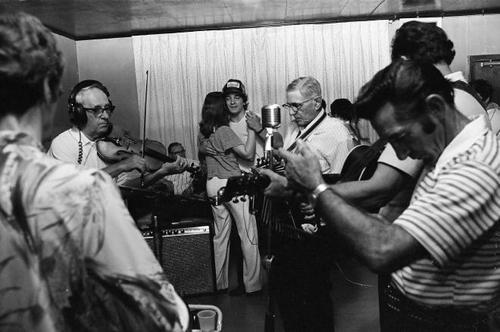
“I was married to Fred for 12 years,” Sue said as the Cajun-French band packed up their gear. “Divorced after 12 years. Stayed 12 years before coming back into the business. Remarried to a man that was Fred’s best friend. And came back into the business. We have two beautiful daughters.”
Over the years Sue would tell her daughters Sandy, 62, and Sharon, 59, that Fred’s Lounge was a gold mine. Fred opened the bar six days a week, closed on Sunday, although there was always talk of opening after mass. The happy Cajun-French bar was mentioned in a 1990 National Geographic article. Late American roadie Charles Kuralt visited Fred’s Lounge. “My daughters looked at me and said, ‘You expect us to be here every Saturday?,” Sue declared before taking a dramatic swig of Hot Damn. “I said, ‘Yes., I expect you to be here every Saturday. Your father is getting old. We need to take over the business, which we did.”
Fred died on July 15, 1992.
The daughters told their mother they were going to sell the lounge. “I said not until we owned it 50 years,” she said. “They asked me, ‘You want us to quit good paying jobs for four years to run a bar in Mamou? Well, they were off on Saturdays. I was working as well, right across the street. I was a legal secretary for 23 years. We said, ‘Let’s try Saturday mornings’.”
So they gave it a shot, so to speak.
And hot damn, it worked!
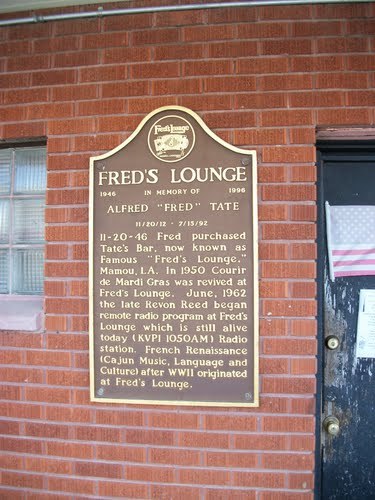
On Nov. 26, 1996 former Louisiana Governor Mike Foster came out to help dedicate a marker to Fred’s Lounge. The plaque was installed in front of the lounge. In part, it reads, “…June, 1962 the late Revon Reed began remote radio program at Fred’s Lounge which is still alive today (KVPI 1050 AM) radio station. French Renaissance (Cajun Music, Language and Culture) after World War II originated at Fred’s Lounge.”
“That was the biggest day in Fred’s history,” Sue said. “On January 1, 1997 we sold the business and they kept me as manager. And public relations.”
Fred’s Lounge is far more than a bar.
Barry Jean Ancelet is a Louisiana folklorist and author of the acclaimed “The Makers of Cajun Music (Musicians cadiens et creoles’) [1984, University of Texas Press]. He is also an executive board member of the Council for the Development of French in Louisiana (CODOFIL), based in Lafayette.
“Fred’s had a lot to do with the cultural activism that was occurring in South Louisiana in the 1960s,” Ancelet said from the University of Louisiana at Lafayette where he teaches French and Cajun-Creole music appreciation. “Ralph Rinzler (of the Smithsonian) and (folklorist-folk musician) Mike Seeger came down here as field workers on behalf of the Newport Folk Festival. One of the reasons they were sent was because Alan Lomax was on the board and he had done some field work in 1934 with his father in South Louisiana. He was interested to see the extent if this non-English speaking culture had survived in any way from what he encountered.”
Rinzler circled around Fred’s Lounge and the now-defunct Casanova Lounge and Traveler’s Cafe in downtown Mamou. Like a two-step waltz, Reed moved between clubs with a mobile broadcast while recruiting area musicians like Nathan Abshire, the Landreneau cousins (Adam and Cyprien) and the Balfa Brothers to perform on Saturday mornings. Ancelt said that Rinzler invited the Cajun-French headliners to the Newport Folk Festival and the Smithsonian.
“Ralph Rinzler was using Fred’s as a field work opportunity,” he explained. “ Rather than trail down these musicians wherever they were at home, all he had to do was go to Fred’s and they were coming to him. He drove around and saw a lot of things, but it was smart field work tactic to go to Fred’s. One school of thought for field work is to look for what you think you might find. The other is to go looking and discover what’s there. The second one is much more open ended and in a way more productive.”
* * *
Sue discovered Fred Tate at the lounge.
Marie’s Restaurant was on the north side of the original lounge and Fred’s operation was on the south side. Sue’s mother ran the restaurant.
Sue reminisced, “Six years old I was bringing people a glass of water and a cup of coffee. I’d walk here from my house three blocks down to meet my mother to eat breakfast and then walk to school. We had two wholesalers in Mamou. Guillory was dry goods and Mamou Wholesalers was groceries. All the men would have coffee and biscuits before they’d go to work. I met Fred while serving all those people. I refused to marry him when I was 16. I graduated Mamou High School. I got married June 8, right after I turned 17. Fred was 20 years older than I was. It was the best thing I ever did in my life.”
After Fred and Sue were divorced Fred remained a devoted father.
He would monitor their daughters when they left the now-shuttered Joy movie theater across the street from the lounge. “They would come by the bar and say, ‘Daddy, we’re going home,” Sue said. “He’d leave the bar, stand on the corner—our house was on the next corner—and once they got in the house, he would call me.
“I was out dancing and drinking.”
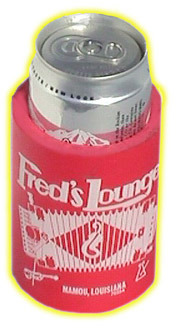
Steve Guillory is present day owner and at two in the afternoon he clears the room fast.
After the lounge closes, the FredHeads make a beeline across 6th Street to the large lobby and bar at the newly renovated Hotel Cazan. The 17-room hotel (rooms between $44 and $66) was originally a bank building before a fire destroyed the bank in the 1940s. The corner building was rebuilt with Chicago red brick as a hotel. Cazan is the historic surname of a land owner in nearby Ville Platte.
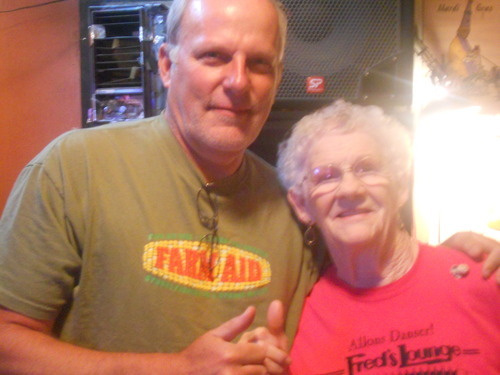
Me and Sue before hitting the road across the street.
Homer LeJune and the Cajun Kings play more chank-a-chank and swamp pop. There’s more shots of Hot Damn to be had. “The only bad thing is that when you get up on Sunday morning there’s not a restaurant in town that is open,” Sue said. “Not a biscuit, nothing.”
Eunice (pop. 10, 420 is the largest big city near Mamou, just 12 miles south. The Evangeline Parish seat of Ville Platte is 10 miles way away. Ville Platte (pop. 7,410) is the home of “Cajun Country Radio” KVPI-AM which broadcasts from Fred’s.
“The radio program is all in French,” Sue said. “A high school teacher (Revon Reed) started the program in Eunice. Needless to say, his teaching salary didn’t cover his whole family so he asked Fred if he could do a Saturday jam session at the lounge. It started as a 15 minute spot and ended up being an hour and a half.”
Reed launched the program on KEUN-AM in Eunice. He brokered three hours from the station and sold sponsorship himself. Reed hosted the show but did not play any live music.
Ancelet started going to Fred’s in 1973, when current station KVPI-AM began broadcasting from the bar. He said, “The whole thing was like a magic trick. Unbelievable. Flying by the seat of their pants. Revon had a little remote broadcaster that he put on a table in the corner of the bar so nobody could come up behind him. He had a little ice bucket and some whiskey and Cokes. There was one microphone on a boom that they would point at whoever was playing lead. They somehow managed to produce this unbelievably live radio broadcast for many years. It became a mecca for young people who were interested in Cajun music in the 1970s, because you could stand right next to (self-taught accordionist) Nathan Abshire and watch him move his fingers.”
Donald Thibodeaux and Cajun Fever played live music on Saturdays from 1965-76, acccording to Sue. In 1999 they recorded the live CD “Direct From Fred’s Lounge.”
* * *
French settlers named “Mamou” for mammoth.
And Mamou has a small but mighty cultural heritage.
Cotton and farming used to be the main gear that drove the economy in Mamou. In 1915 there were four cotton gins in Mamou. Today most of the residents work in the crawfish industry.
Dewey, Will and Rodney Balfa are from Mamou. Their father was a sharecropper outside of Mamou. Will and Rodney were killed in a 1979 automobile accident. In 1982 Dewey was given the National Heritage Award by the National Endowment of the Arts (NEA). He died in 1992.
Author-folklorist Ancelet said, “The result of Ralph Rinzler’s initial field work was the invitation in 1964 to the Newport Folk Festival of Gladius Thibodeaux (accordion and father of former Fred’s headliner Don), Vince Lejeune and Dewey Balfa who went as a last minute replacement on guitar. They found themselves playing in a context they had never imagined.”
The South Louisiana musicians had never been to a “festival.” They did not know what a “festival” was.
Ancelet recalled, “Dewey remembered that during the first song he was thinking, ‘My God, we must really stink. This must be terrible because nobody is dancing.’ The only context any musicians around here knew was the dance hall. And your measure of success was how many people you got dancing. At Newport, they were playing to a seated listening audience. Newport crowds were very savvy. After that first song the audience burst into applause. These three guys looked at each other and said, ‘What was that?’. Nobody ever applauded in a dance hall.”
The trio returned to South Louisiana with a new spin on their dance music.
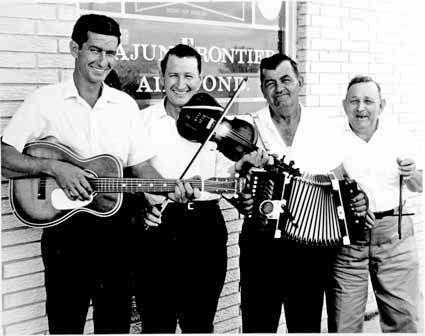
The Balfa Brothers
“Dewey had the foresight to see something important had come of this,” Ancelet said. “So he began working here, as he put it, ‘To bring home the echo of that ovation.’ It resulted in 1974 in the establishment of what is now Festival Acadiens et Creoles (Tribute to Cajun Music in Lafayette). And Dewey said, ‘We have to do this where people can’t dance, because if they don’t dance they’ll be listening a different way’.”
A handwritten sign behind the small dance floor at Fred’s Lounge declares: “THIS IS NOT A DANCE HALL. IF YOU GET HURT DANCING, WE ARE NOT RESPONSIBLE.”
In recent years accordionist Steve Riley and the Mamou Playboys have carried on the Acadian French culture of Southwest Louisiana. Late 1980s Playboy guitarist Kevin Barzas was a third-generation member of Mamou’s Barzas family which held court for 35 years at Snook’s Dance Hall. In 1988 the progressive Cajun quartet Mamou was signed to MCA Records.
These musicians and others are keeping the French speaking culture alive.
Sue is fluent in French. She said, “I’d rather speak French than English. But very few people now can have a conversation in French. It’s important in the business world. Just three of my 10 grandchildren speak French.”
Soon after it was formed in 1968 the Council for the Development of French in Louisiana imported French teachers from Belgium, France and Quebec. “In 1980 it shifted and we began incorporating Louisiana French into the system,” CODOFIL board member Ancelet said. “Including songs and oral tradition from here. That’s been evolving since then. The challenges are to remain appropriately funded in this climate of draconian cuts. The already miniscule CODOFIL budget was cut in half last year. A bunch of young French speaking activists stepped up and raised the missing half.”
The Lafayette-area FrancoJeunes (young French) hosted several successful fund raisers to fill the budgetary gap. FrancoJeunes promotes French-friendly businesses, encourages billingual signage and services in the public and private sector. The group of twenty-somethings will fund raise again this year. Mamou is an hour northwest of Lafayette.
“My sense, and this is personal, is that we ought to toss the state,” Ancelet said. “Not depend on it any more and we ought to create a foundation to endow it. But that would take several years.”
Fred’s Lounge arguably is one of the most unique watering holes in the lower 48.
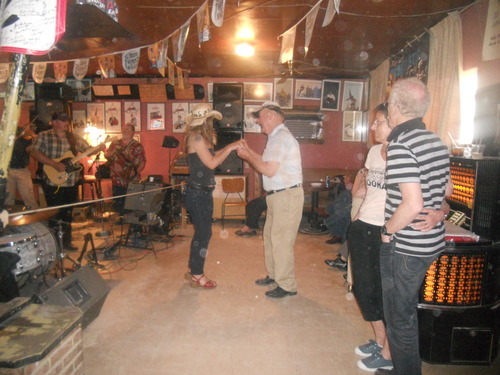
“It’s become a legendary place,” Ancelet said in measured tones. “And as always these places sort of have a patina that is a mix of legend and fact and other things. I did my own field work in the 1970’s not so much in Fred’s, but out of there, and not so much on musicians, because that had been done.”
Ancelet studied Mamou area storytellers. “An amazing collection of storytellers, who by the way, would ricochet between those same six bars on the main street in Mamou where Revon’s mobile radio broadcast would move around in the 1960s before settling at Fred’s. And Fred Tate was an amazing storyteller.”
Ancelet said Fred was a typical barkeep with a gift of gab, but that he also paid attention to detail. He figured Fred had a repertoire of hundreds jokes and stories.
Here is one about Revon Reed’s uncle Regile.
“Uncle Regile was something of a scoundrel,” Ancelet said. “He was hitchiking and got picked up by these two guys. He told them he was going to Beaumont (Texas). And they said, ‘We’re going past that so we’ll take you to Beaumont.’ When they got to Lake Charles (Louisiana) he said, ‘You all have been so nice to me, how about I buy you a steak dinner?’ He was actually going to Lake Charles, not Beaumont.”
So the trio pulled into a roadside diner and ordered three steak dinners. Uncle Regile ate his dinner real fast.
“He said, ‘Listen, I gotta go and make a phone call but I’m gonna’ tell the cashier I’m paying for you all. When I get up there raise your hand. I’ll point to you so she’ll know who I’m paying for.’ So he gets up to the cashier and says, ‘See those two guys over there?’ They raised their hands. And he said, ‘They’re paying for me.’ And he walked out. They never saw him again.”
Such stories live on in the spirit of a tiny lounge in a town that was named for something mammoth.
And very deep.
.

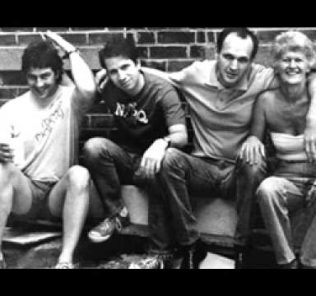
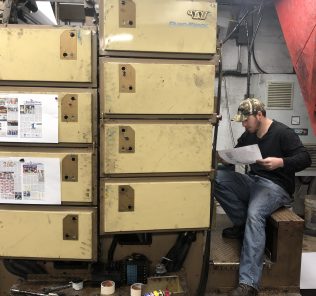
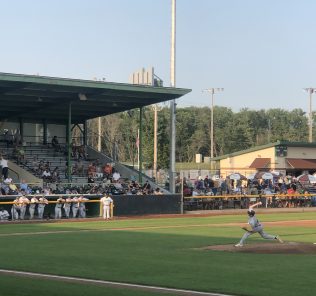
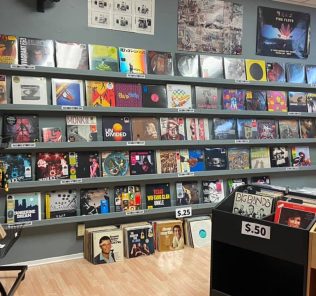
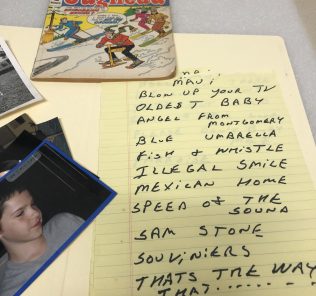
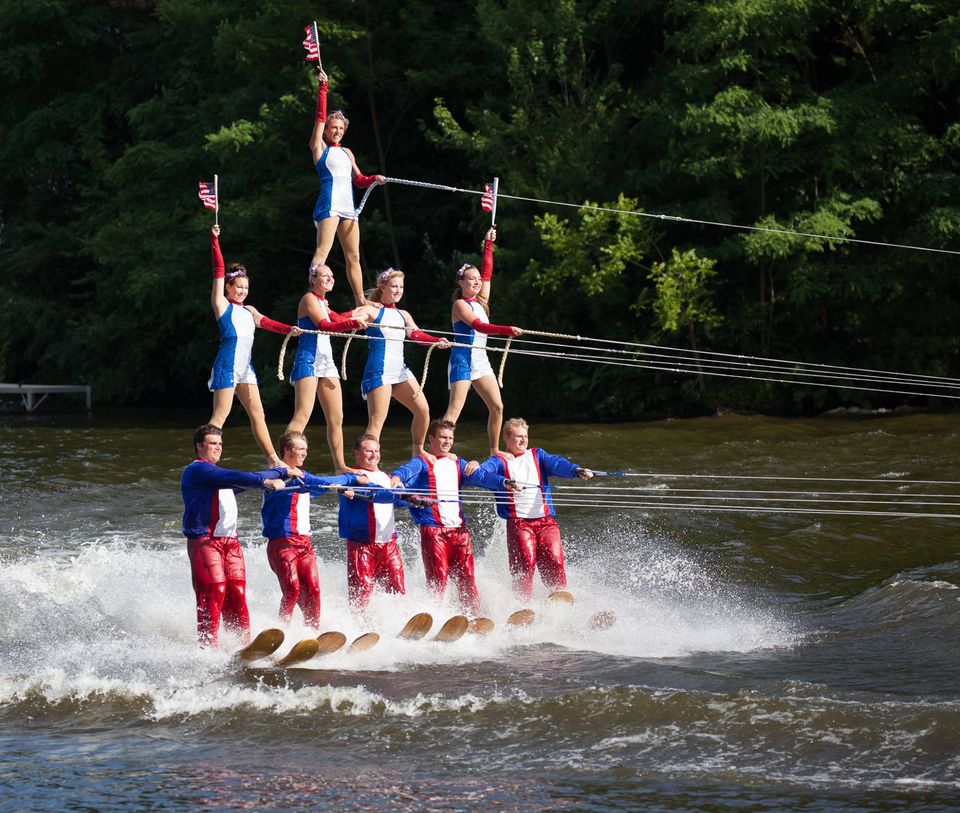

We were there this past Mardi Gras , Feb 9, 2016 as we have been the past 14 years and return frequently from Texas to enjoy the music, dancing , a little drinking and enjoying Tante Sue who is the hospitality, guts, skin and bones and face of Freds. When we returned from outside watching the Courirs going out, Steve of James or whatever his name is was ripping and shredding the arraigned banner and all of the pictures of Tante Sue that had been signed from visitors all over the world. That Man destroyed history that Freds stands for in a fit of rage and tantrum He announce to those there that Tante Sue had been fired and barred. A pall shadowed over the place and most customers left including my group.vowing possibly never to return. I have since heard from scores of people and musicians that feel the same. Memories will last but so will the bitter taste on how it ended.
Jan,
Thanks for sharing this disturbing news.
So what inspired this behavior?, Dave